Building a brand strategy: Essentials for long-term success
Slapping together a couple ideas and a logo is not a brand strategy. Here's a detailed guide to help you create and execute a well thought out strategy to promote your brand.
A brand marketing strategy is a set of guidelines that help businesses determine their core values and what they want to achieve with the business. More importantly, it also helps outline how those values can be applied to the marketplace. For one branding strategy to be successful, it’s not enough to simply have a few bullet points of what you want to do.
Brand strategy is built on a platform of differentiation, where a company can use its value prop to create competitive advantages and satisfy customer needs. The key to long-term success is using brand strategy to define your market position in order to create market share and revenue growth.

To develop a great brand strategy, you need both a thorough understanding of why you choose certain types of brand strategies and a detailed outline of what your strategies will be.
Why?
Because the more detailed your brand strategy framework is, the easier it will be to succeed when you execute those strategies.
Knowing the detailed answers to each question will help determine what your goals should be, how you should approach your customers, and how you’ll measure your success in meeting your goals.
Dig deeper: Why B2B marketing needs brand building more than lead gen
Table of contents
Why is branding important?
- 63% of consumers will pay more to shop with brands they’re loyal to.
- Consumers who connect with a brand emotionally have a 306% higher lifetime value (LTV).
- Companies with poor branding end up having to pay 10% higher salaries.
- 80% of customers agree a brands experience is as important as the products or services it provides
- 84% of marketers say brand awareness is the most important goal.
- Branded content is 22 times more engaging than your standard display ad.
“Emotionally connected customers have a 306% higher lifetime value (LTV) for your brand.”
How to develop a brand strategy?
A brand development strategy can be hard to define, but it encompasses:
- What your brand stands for.
- What promises your brand makes to customers.
- What personality your brand conveys through its marketing.
As you can see, many of these things are intangible. How do you measure how successful you are at conveying a certain personality? How do you measure if you’ve successfully stood for what your brand represents, or if you could be doing it better?
The one main metric for successful new brand development is brand sentiment. And just because it’s hard to measure, it doesn’t mean that you should dismiss it. As Airbnb CEO Brian Chesky made so clear: “The designing of experience is a different part of your brain than the scaling [of] your experience. It’s a different skill set. The scaling of an experience is a highly analytical, operations-oriented, and technology-oriented problem. The designing of experience is a more intuition-based human, empathetic, end-to-end experience.”
Dig deeper: Rethinking fit, growth and go-to-market for the modern startup
It seems trivial, but in a larger company, these two different skill sets would be handled by two different teams that probably don’t often commingle, let alone agree on everything. That’s how you waste time, money and energy. In a smaller company, you’re often missing a “creative” team altogether. Brian knows how to build a brand because he understands the real levers at play here.
For example, when my agency helped the Shark Tank company, Plated, scale to $100M in revenue in just 18 months, and then exit, you have to understand they had a team of 15 marketers who were struggling with customer acquisition(!), despite having a beautiful brand and a perfectly functioning website and funnels. So, I really appreciated the founders Nick and Josh saying something along the lines of, “We are the least creative guys in the room … so if you guys say this is what we should do, then let’s do it.” Great! That’s why you hire experts on the matter, and it’s ok to take a back seat, if you don’t have a strong understanding or opinion on the direction.
It’s amazing how many funded startups are in a rush to build their marketing team. The story above should help you realize there is much to resolve before doing that — otherwise you’ll be burning cash at a higher rate than needed.
Does this resonate? Some see branding as fluffy, touchy-feely emotional stuff and that’s why they often fail with branding. First, that’s a superficial way to approach it. Branding is critical to your brand’s existence! It also feeds your entire team’s culture.
Let’s dive into this skill set.
Dig deeper: Transform your B2B brand: 7 strategic insights
Developing intuition to guide ‘brand storytelling’
Branding strategy involves the intuition side of your mind. But you can also use data to guide your direction and long-term goals. One way to understand if your brand is on the right track in its branding strategy is to think of your brand strategy as a story you are telling.
A good story is not just something to read on a page — it’s an experience. And for something to be an experience, it needs to have a beginning, a middle and an end. At the end of the experience, there must be some kind of change from the beginning.
What causes a change in a story? Tension. There must be tension between your antithesis and your thesis.
In marketing terms, your “antithesis” is your customer’s pain point. Your “thesis” is your solution to that problem. The tension, therefore, is the customer’s problem itself. This is the core of your entire product-market fit. If you don’t have any tension there (problems to solve), then you don’t have a business, period! There also needs to be tension in your customer insights to help inform the most relevant positioning possible.
So, at the end of the day, brand strategy boils down to one thing: storytelling. Your brand’s strategy is its story, its vision, its heart, and soul.
As an example, in the case of “Don’t Look Up,” Leo Decaprio’s character has to transform from his quiet, inside voice, to one of rage and frustration upon learning how hard it is to get an entire planet prepared to deal with a major catastrophe, all while combating multiple saboteurs with alternative and selfish agendas. The reality at the top of the film stays exactly on course. So, where is the change, you ask? It comes from within himself and his associate Kate, as they each lose their families and a bit of their sanity over the truth of their discovery, which drives the narrative, until they finally find themselves again, while the impending doom lives in the background through the final reveal.
That narrative is the same as classic B2B customer journey mapping. Nailing who your supporters and advocates are, as well as potential saboteurs to a purchase, is critical to building a pathway through the phases of brand awareness and consideration.
Tension has been the basic building block of storytelling since the first Greek plays were performed in the Theater of Dionysus, at the beginning of the fifth century. The plays and storytelling were engineered around the logical flow of crisis and emotional journeys, and this process carried over to modern times — mostly because human nature hardly changed since that time.
This is exactly what good branding does as well — it inspires action, change, aspiration, or in some cases, gets your customers to fix something that ails them or change their minds. When your brand is an awesome experience, it transforms your users!
If you don’t believe story matters, then you’re going to have a hard time creating the kind of message that evokes emotion and action. At the end of the day, all your brand has is one amazing story, broken into snackable bits and pieces, told over time, across various touchpoints and pain points. That’s it!

Beyond brand strategy: Brand position and building a strong brand identity
Today, most businesses cannot count on being the only player in the market. Chances are good that your niche is heavy with competitors. The challenge is making your offerings stand out from others. Sure, you can pack in feature after feature, but what comes next?
For instance, if your SaaS platform space is already maxed to the gills in features? What do you do? Cramming more features in does you no good, so how do you make yourself stand out in an ever-more competitive market?
In a sea of competition, you have to compete either on innovation or brand, which means storytelling and effective brand positioning, or, if tapping into a well-funded and robust R&D department that can base new features on actual user problems. If not, that’s OK. For most companies an easier entry point is to become a leader in the pack and to stand out, you have to go all-in on brand positioning and you need to be consistent, memorable and distinct, all while doing this creatively.
Of course, that’s easier said than done.
Before starting my agency, Noble Digital, in 2012, I was a TV commercial director. My role was to lead a team and execute national campaigns for the largest brands on the planet. In one case, Budweiser hired me to produce six commercials with $600 million in media spend alone over a one-year campaign. I have been fortunate enough to work with some of the biggest brand managers out there. In total, I have $25 billion in media spending behind my life’s work, so I want to share what I’ve learned from my “traditional” days of branding as well as now in the current age of branding.
Where did branding start? Many point to Mesopotamia where trading and selling took place at a very high rate. It was a time when the seller could not always be present, so the branding acted as a marker of quality.
The quality of a brand is measured at a high level with attributes like: culture, values, reflection, personality, archetypes, promise, reward, benefit, reasons to believe, advantages, discriminators and differentiators.
However, there are also attributes about the space that your brand operates in, such as category, competition, source of business, target groups, relevance, and insights.

As we zoom in on the business model canvas, we start to see where the impact of branding falls. In fact, the value canvas has a “value proposition” at the dead center of the business model canvas.
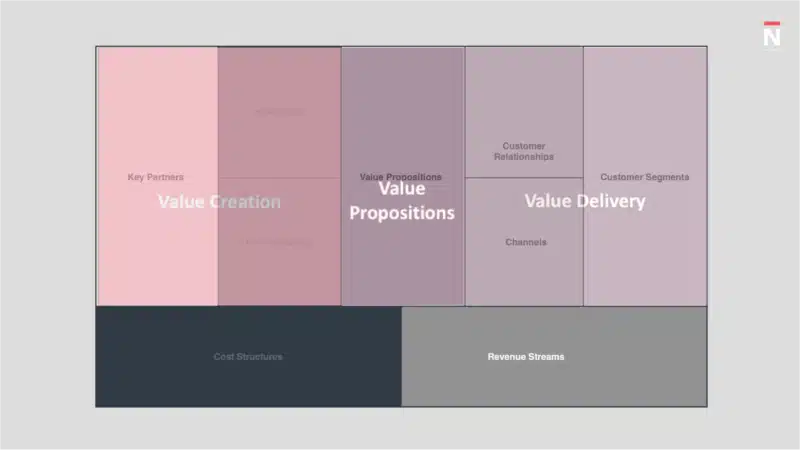
That’s because no matter how amazing your product is, if it doesn’t resonate with your audience, you’ll be dead in the water. Your product-market fit and value proposition form the engine that makes everything flow.
What your customers value is just as important (if not more important) as what your brand values. It informs what you make and how your entire company operates, down to how you speak to individual customers.
Branding is not a superficial exercise in making things “look pretty.” Great branding means customer acquisition performance, hitting sales goals and scaling revenue streams. Modern branding is about architecting success through both storytelling and engineering to achieve a strong brand experience while meeting fiduciary goals.
“Modern branding is about architecting success through both storytelling and engineering.”
Here’s the key: The brand story should always come first. The first step in comprehensive brand strategy development is to define who you want to be and what you’re trying to say. Engineering should follow that organizational direction as it’s way easier than trying to take the bigger, emotional factors and retrofit that onto what was already engineered. (This is how website initiatives easily steal a year of your life away.)
Characteristics of a strong company brand
What makes a good company brand? It’s more than having the right visual elements or a solid brand story. Below, we’ll break down the components required to ensure you have the right brand architecture in place to support your marketing plan.
- Physical characteristics: At the base level, we have the physicality of your company brand – its visuals, including your brand logo, typography, company colors and other visual cues that help consumers identify your brand amidst a sea of competitors.
- Personality: What is your brand’s personality in your customers’ eyes? Is it playful and witty? Straightforward and dependable? Innovative and creative? Picture your brand as a living thing – how does it act in the world?
- Culture: Brand culture and company culture are related but different. Here, we’re talking about how the set of values you espouse come together to create the foundation of a company brand.
- Relationship: How does your company intersect with your customers? What’s the relationship between your products/services and those who buy them?
- Self-image: How do your customers see themselves with your brand? Do they feel more capable? More innovative? Better prepared? Use this to flesh things out and create a strong visual identity that helps your customers see themselves differently.
- Reflection: How do you view your customers? How do you portray them in your ads and other marketing collateral?
Developing a strong brand identity
Using the information in the previous section, you can now begin building a strong brand identity. The goal here is simple — connect what matters to your business with what matters to your customers. For instance, how do your goals connect with the goals of your customers? How does your mission address your customers’ pain points? Effective brand positioning requires that you move the needle from how your customers see your brand now to how you want them to see it.
One brand positioning tool at your disposal is, to begin with, a benefits ladder that takes you from the base customer problem through the various benefits that help solve that issue.
To do that, create a mission statement that encapsulates your organization’s purpose. Once you’ve done that, it’s time to create a single guiding statement (brand positioning statement) that connects with every aspect of your brand, while supporting the emotional benefit that you offer customers. Doing so ensures brand consistency across all touchpoints.
Finally, it’s also important to remember that no brand is built overnight. It requires time. How long did it take for Apple to become what it is today? What about Reebok or Nike? In point of fact, it took almost 20 years for Nike to even arrive at the brand strategy the organization follows today, with much trial and error along the way. For instance, they began by targeting top athletes but realized they would have to broaden their scope to include anyone who valued health and fitness if they were ever going to see success.
Digging deeper into effective brand positioning
Dual Process Theory explores how our brains go looking for shortcuts to process things. It helps people make fast decisions on an intuitive level. It can also hijack other memories we have and attach themselves to them. This is why getting into emotions and qualitative research is important as emotional decisions can override our mental decisions. Translation: This helps us cut a 120-day sales cycle down to 45 days. What would that mean to your bottom line? Go ahead, pull out a calculator and do that math. Whatever that number is, you could easily spend roughly 10% of that total amount (rev + growth) on rebranding — and more if you want to be aggressive.
Your digital brand strategy is a long-term plan that documents specific principles to help keep your brand consistent, memorable, and distinct with time which keeps you at top of mind with your audience. It can also help align employees to the core beliefs and aims of the brand – something I had noticed the power of during my time while working with and consulting the brand Subway, on a campaign.
At the tip of the spear is the business strategy, which leads into brand strategy. What is included in a brand strategy? It covers things like purpose, vision, mission, beliefs, values, attitudes, audience, proposition and positioning. Once set, the goal is to use that documentation as a guide for every decision you make, whether it be a TV commercial, website build or a search ad sentence.
As you move from purpose to impact, you’ll find your brand system, which is the visualization of your brand persona: brand logo, tone of voice, colors, composition, photography, typography, and motion.
We’ve seen business strategies. They tend to be about growing, with charts that go up into the top right quadrant. Yes, you want to make more revenue. We get it. But how will we actually accomplish that?
Moving into modern brand positioning is really about customer-centric messaging and then making that actionable. But how do you make branding actionable while ensuring brand consistency? It’s all about your brand activations.
Telesign CPaaS platform
As a B2B brand strategy example, Telesign a CPaaS (and IT security) was a C-series funded platform with 500 employees that I was consulting. Telesign pioneered text verification notifications. The company serves large, multinational clients like Microsoft, and was acquired by BICS. However, the complexity of its offerings made it challenging for potential clients to understand their services and they were in a loaded space.
The result? Long sales cycles. Basically, sales was doing most of the work and the marketing was missing the mark on how to warm up prospects into warm leads, ready to purchase.
To overcome the disconnect here, we updated Telesign’s brand message house, brand pillars and overall brand messaging, working from data first. From awareness all the way through the handoff to sales. The end result was an update to its content marketing funnel that decreased the time it took for qualified leads to become clients by half. That literally means millions more in revenue per year! This is how branding and marketing strategy intersect into: digital media branding strategy and social media branding strategy. A critical messaging change at the top of their messaging pyramid helped optimize all the content builds that came after, which then gave marketing a better alignment and hand off to sales and assisted them in revenue growth year after year from that point on. Branding can be tethered to sales and if you start your branding strategy off on the right foot, you’ll see a change in all departments. Including your data being segmented is better for future optimization.

LEGO
LEGO’s history dates back nearly a century. Throughout that time, the company’s mission has been “to inspire and develop the builders of tomorrow.” By defining that mission early on and then baking it into the company’s very DNA, LEGO has been able to create a thriving brand. You can see this in everything the company does, from the design and creation of new sets to their communications.
For LEGO, it’s not (just) about selling toys. It’s about helping its customers develop. By focusing on developing people, the brand has been able to evolve and grow over time and continually elevate its brand position.
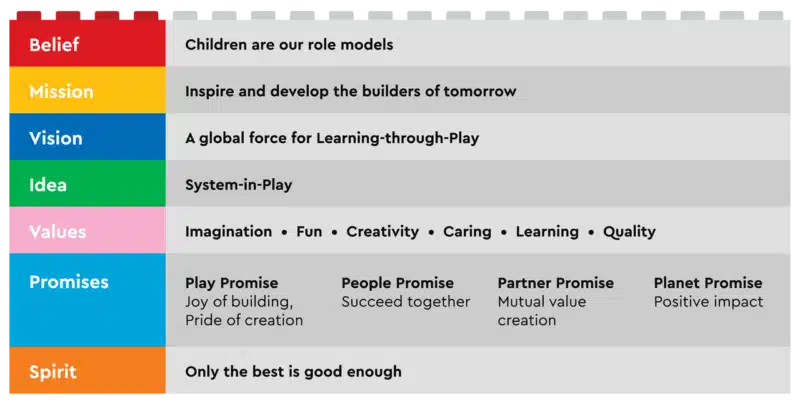
Brand consistency: Maintaining a unified brand experience
“A business with consistent branding tends to experience up to 20% greater overall growth and 33% higher revenue compared to one that struggles with off-brand content.”
Marq: Brand Consistency Report (registration required)
There is even more to brand consistency than a strong brand identity and mission. True, having strong identifiable brand-marks and a consistent tone-of-voice, like LEGO, are the building blocks of brand consistency (all puns intended). More than that, brand consistency extends out to every way in which a brand is experienced by a customer. This is because our subjective experience triggers emotional response, which we only need to look at a brand’s one star (or five star) reviews to see at play. So whilst it might be difficult and inadvisable to script a coffee shop employee to match tone-of-voice, for example, defining what we want customers to feel at each touch-point and communicating that in our internal brand guidelines through shared vision and values, gives staff ‘freedom-in-a-framework’, and ensures brand consistency.
Brand evolution: Adapting to changing markets and trends
As markets change and trends come and go, it is inevitable that brand identities have to be able to evolve, unless their position of difference is a niche kind of nostalgia (think Betty Crocker) or an assurance of historical credibility (John Deere). Even so such brands will undergo subtle, if infrequent brand refreshes to bring overall look and feel up to date.
In more fast-paced markets with rapidly evolving consumer expectations, brands that can evolve quickly while staying true to their DNA emerge on top. Apple is one of the best examples, when we consider today that to most consumers it is a phone company (iPhone), whereas 20 years ago it revolutionized the music industry (iPod) and 40 years ago, home computing (Macintosh), all whilst steering toward a design-centric mission creating near rock-star levels of fandom.
A brand architecture framework
Creating a brand architecture framework can get very involved and could be an entire article on its own. Just use the outline below and it becomes easier to account for your existing products or services, as well as build out future product branding or services.
- Make it easy for people to navigate what you offer.
- Reinforce individual products or services that are your biggest draws/hottest sellers.
- Make sure that you’re able to build a strong company brand and brand equity without damaging the brand of your assets.
- Focus on creating economies of scale by tying asset brands to the parent brand.
The secret to growth
As a strategist, I find that one of the most important ingredients for success is talent, and in many cases, that talent may come from outside your organization. Some of the strongest brands in the world were built by advertising agencies, not internally.
The culture of a successful brand is often repeating the same thing over and over for success. One important goal for any corporation is to be somewhat predictable with their fiduciary responsibilities. Oddly enough, to get to that place, they often need outside help, since they are not wired for this. Why would a company that relies on predictable results for growth know anything about creativity and breaking molds? If they’re any good at their business, they often won’t even have that kind of talent and thinking internally.
The question of brand management versus brand building
There are two types of people — procedural workers and creative/inventive people. In fact, Netflix CEO Reed Hastings’ famous culture deck, (now with 20 million views) made it clear that there is a much lower ceiling for procedural work vs. creative/inventive work, where the more you invest in creative talent, the greater the rewards you reap.
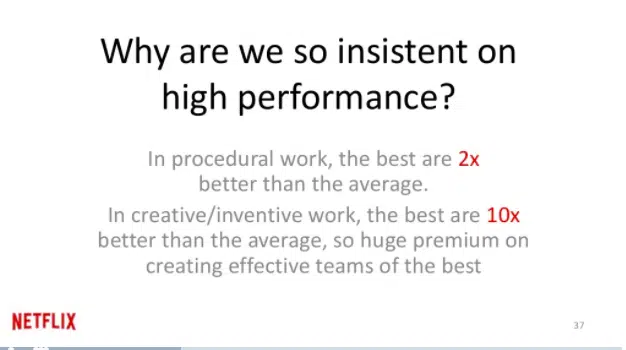
What this means is that you shouldn’t expect an individual with outstanding organizational task management and soft skills to be amazing with creative builds. These are two very different types of people and it’s very rare to find both quality management talent and creative skills within the same individual.
“You shouldn’t expect an individual who has outstanding organizational task management and soft skills to be amazing with creative builds.”
This is why the strongest, most recognized brands on the planet rely on creative advertising agencies to help them refine their brand story for outward-facing initiatives and create a comprehensive brand strategy. Rarely has our own agency seen a corporation do better internally. Internal teams often fail to deliver effective brand strategies.
“Companies with poor branding end up having to pay 10% higher salaries.”
Creating the right message
Story matters, so to be successful in motivating consumers, you need to create the kind of message that evokes emotion and action.
Why do we do this? Because a well-told story is unforgettable, it translates to people caring about your brand, which inspires loyalty and helps with recall. These are things no amount of tech or media can or will ever do.
Tech and media merely amplify those sentiments. If you don’t have this level of depth to your story, it will just be garbage in, garbage out.
The importance of creative messaging
As CEO of BBDO, Andrew Robertson mentioned at an AT&T Shape event that media leaders like Sheryl Sandberg at Facebook made one thing clear to him:
“80% of available return is a function of the creative and the content.”
Let’s unpack that. A brand’s success is attributed to having the right creative message and not just being in the “right time” or “right place.” It’s about more than meeting your potential customers where they are. You must be able to effectively communicate with them when you do, and that requires creative messaging that ties in with your brand positioning and brand identity.
What does Robertson’s comment mean? It means that your focus shouldn’t be solely on the tech involved; instead, concentrate primarily on story and positioning.
What does focusing 80% of your energy on messaging look like? Well, for one thing, it doesn’t look like this:
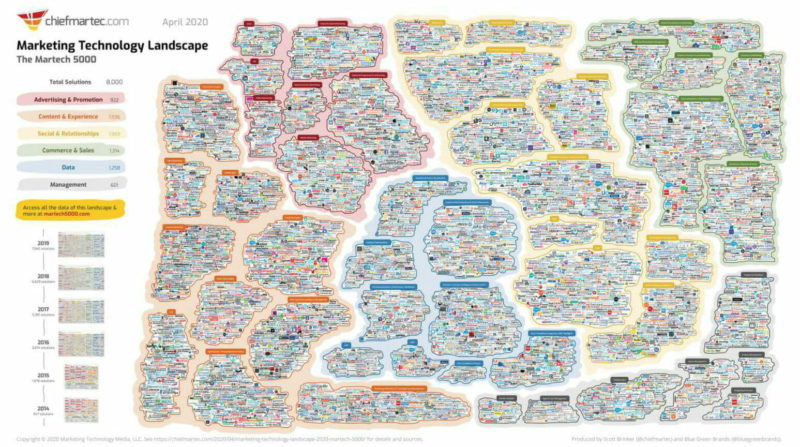
Instead, it should look more like this:
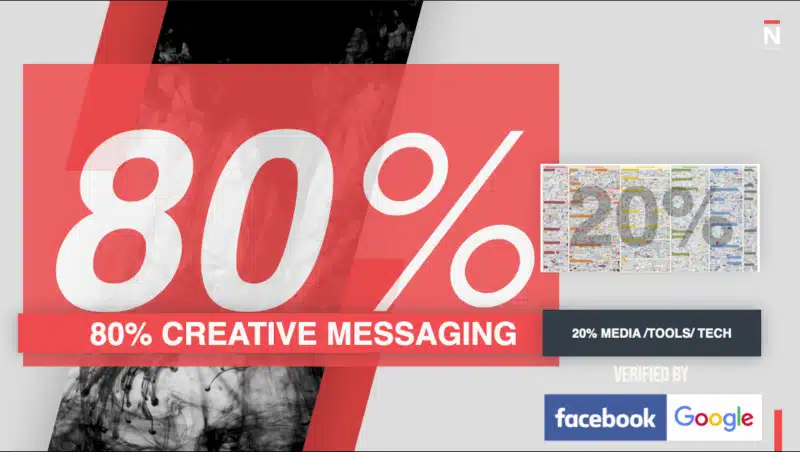
Everyone is mostly focused on finite/numerical data, so I find the opposite to be true. Companies are spending thousands to millions on media (blank “billboard” placements) with next to no thought on the story part. So, it’s more like 99% media/tech/stacks and only 1% on creative — and they wonder why they seldom hit performance goals.

The issue here is that marketing is seldom a “math problem”— it’s always a story problem. The real math happens later, at $50M+ in revenue, when you’re milking a cash cow. Until then? You need emotional stories to engage new customers, regardless of how big or small you are (to create the math problems you’re hoping for). So it is important to understand your strategy first before you focus on the execution of the strategy.
Translation: Don’t worry about media until you have a creative strategy that translates your brand into an outward-facing campaign for your marketplace.
Define your brand and its objective
Your brand’s objective is simply its purpose. Knowing why your brand exists, what purpose it has in the world, and what it stands for is what defines it from the very start.
When you want to define your brand, you’ll need to ask yourself some questions:
- What problem does my brand solve?
- Who is my ideal customer?
- Who is my competition?
- What does my brand make my customers feel?
- Why do my customers trust me?
- What is the story behind why my brand was created?
- If my brand was a person, what would their personality be like?
- What are my customers wanting/needing or struggling with?
Want some real-world examples? Consider Uber, Webflow and Airbnb, all three of which have mastered the art of brand positioning.
Once you answer these questions, you can begin to worry about things like brand logo colors and font, your motto or tagline, and other marketing elements to communicate your brand’s overall story.
Let’s look at an example and put this into action.
Let’s say you have determined your brand’s ideal customers are young women getting ready to get married. Your competition includes high-end bridal companies with very elegant looks, but you are presenting yourself as more youthful.
You are trustworthy because you don’t sugarcoat the reality of expensive weddings. Instead, you help brides have their special day without going into debt. You have your story of why you created this brand, and if your brand was a person, she would be a young, thrifty bride who wants a beautiful day but has a practical head on her shoulders.
With all that in mind and knowing you are targeting younger brides, you can stay away from elegant and mature logo colors. Go with fresh, trendy bridal colors that are feminine and pretty. That’s how you translate your brand story into your marketing.
Target market research
Once you understand your brand strategy, you may be ready to jump right into executing your marketing. But before you get started, there is another important step you need to do first: target market research.
So taking the previous wedding example even further, instead of shying away from the fact that your brand is for affordable weddings, you lean hard and with no apology! Like the Airbnb “Strangers” example, use insights to help people reframe and reconsider their stance on just about anything! A perfect example is Jim Gaffigan, a master of shining a new light on things we rarely question and digs in deep on the whole institution of weddings
Looking at obvious things in a new light helps unlock humor and ah-ha moments for people who are barely paying attention to your marketing or more importantly, their situation… Can you make your audience laugh at themselves? You have to do some work to get their attention. You have to be this sharp.
Researching your market — and understanding who your audience really is and what will grab them emotionally — is a big part of executing your brand strategy correctly. There are some things you’ll need to do in your target market research, including creating a customer persona.
A customer persona is a detailed description of the ideal buyer who would not be able to resist buying your product or service. This persona helps you understand what type of person you are targeting with your marketing. You can’t have an emotional impact if you don’t know who it is you are trying to connect to.
The key to a creative team’s output is to give them sharp insights. Insights unlock the problem at hand and shine a new light on it. Since your marketing is working against the common enemy of attention, you don’t have time to explain it. The insight should be shocking or disruptive. It should have a truth that makes you laugh or cry. Quite often, it’s not even something brand new. Rather, an insight, framed the right way, makes you look at something you already know in a new way.
Understand the consumer journey
The next thing to understand about your ideal customer is where they are in the consumer journey. The consumer journey is a map that shows how a consumer is connecting with your brand at any given moment. It can range from “not connected at all” to “loyal brand advocate and repeat customer.”
Along the way are points like “interested in your product,” “interacting with you on social media” or “first-time buyer.” Understanding the consumer journey as it relates to your business will help you come up with a roadmap to move consumers along to the ultimate goal.
For example, if you find many of your consumers are dropping off the journey map after their first purchase and never returning to your store, you may need to consider creating a loyalty rewards program or optimizing for a higher quality audience.
Invest in creative brand guidelines
Too often a brand wants to start a branding engagement with us “developing brand guidelines.” I don’t recommend this. This is like walking into a restaurant and letting the chef decide what you want to eat. It’s all fine if they happen to match your expectations. Realistically, you need to get involved and communicate. You need your creative partners to start with conceptual ideas of what your brand could be, first. Explore concepts and even design rough, ad-like objects and manifesto scripts to help envision what your brand could look and feel like before locking things down that haven’t even been considered or tested.
Once you understand your brand and your audience on a very deep level, it’s time to think about how you will deliver your message. This is where you’ll start to get creative with things like the logo design, the fonts you use on your website, the colors you choose to represent your brand, the general tone of your advertisements and the imagery you use so that you can make that execution repeatable.
These elements are very important for creating a long-term recognizable brand. Once people have connected to your brand, they’re no longer considering your values because they know them. Now they are just recognizing your brand’s colors, brand logo, and font and instantly adding you to their basket. So you need to ensure that these elements are chosen carefully and that they truly relate to your message.
Brands do evolve, but it’s important to set the creative guidelines before additional marketing executions. This allows you to ensure that even in the future, your branding will match your story.
Competitive analysis
Another thing that brands need to research before executing a marketing strategy is the competition.
Competitive analysis is extremely important because it helps you understand what specifically differentiates you from the competition, and that is something you’ll want to focus on in your marketing message. Even if you’re a new product in a new space, you still need to understand your neighboring spaces. When we helped Biohm probiotics, they were essentially a new product but they didn’t have the capital to go out in a naked market where no customers were looking, so we piggy-backed by entering them in the probiotic space and then doing education campaigns to help them understand the critical differentiators. This is why they launched selling out of inventory three times in opening months — because we did our homework right.
If you attempt to execute your marketing first, you may end up saying the same thing as every other company out there, which doesn’t inspire the customer to shop from you over them.
Summary
Overall, branding has not changed dramatically in the last decade or two. What has changed is the explosion of placements and applications for expressing your brand across new and upcoming outlets, platforms, and opportunities.
The most important takeaways about brand strategy in 2022 are:
- You need to research and understand your customer, including insights.
- You must know what your brand stands for, and what your brand story is.
- Craft your brand story and know how it intersects with your audience.
- You must build your marketing techniques on an understanding of your customer and what your brand stands for before you ever begin executing marketing campaigns.
- You need people with both good organizational/management skills and great creative skills. They are usually not the same people and quite often not in the same building.
- Don’t be afraid to look outside your organization for help when it comes to creativity and strategic branding/brand positioning. The biggest brands in the world work with ad/creative agencies for that very reason.
It’s that easy and that complex. Take the time to do this right from the beginning, and you will have a much more successful marketing strategy.
Contributing authors are invited to create content for MarTech and are chosen for their expertise and contribution to the martech community. Our contributors work under the oversight of the editorial staff and contributions are checked for quality and relevance to our readers. MarTech is owned by Semrush. Contributor was not asked to make any direct or indirect mentions of Semrush. The opinions they express are their own.
Related stories
New on MarTech